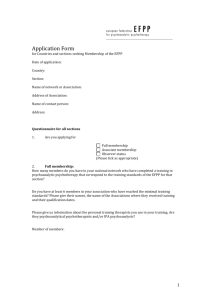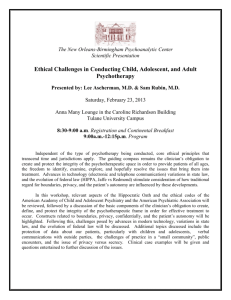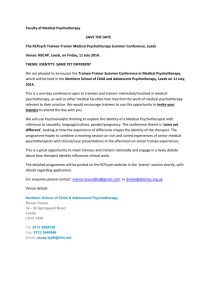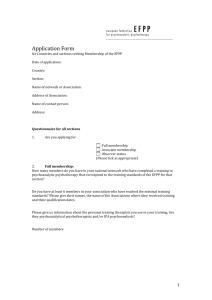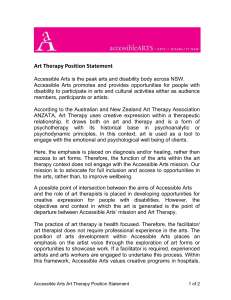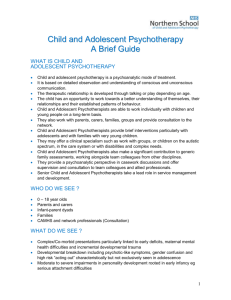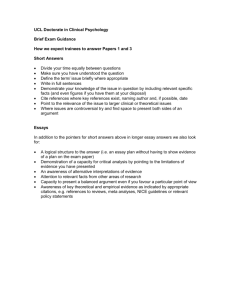Doctorate in Child and Adolescent Psychoanalytic Psychotherapy (DPsych)
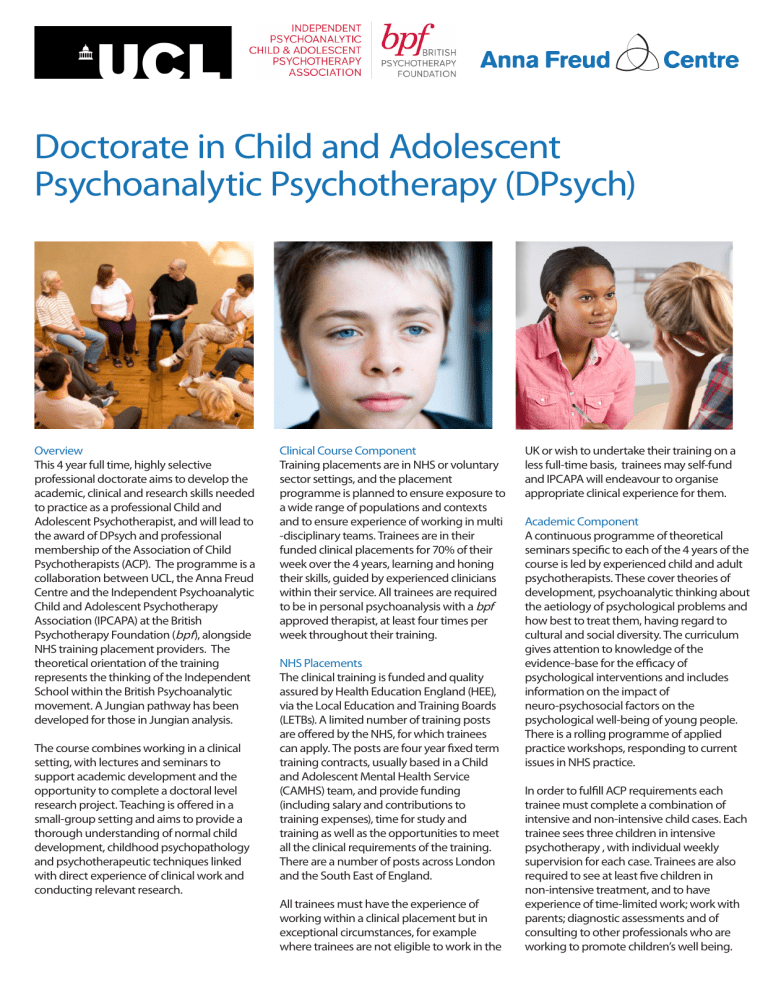
Doctorate in Child and Adolescent
Psychoanalytic Psychotherapy (DPsych)
Overview
This 4 year full time, highly selective professional doctorate aims to develop the academic, clinical and research skills needed to practice as a professional Child and
Adolescent Psychotherapist, and will lead to the award of DPsych and professional membership of the Association of Child
Psychotherapists (ACP). The programme is a collaboration between UCL, the Anna Freud
Centre and the Independent Psychoanalytic
Child and Adolescent Psychotherapy
Association (IPCAPA) at the British
Psychotherapy Foundation ( bpf), alongside
NHS training placement providers. The theoretical orientation of the training represents the thinking of the Independent
School within the British Psychoanalytic movement. A Jungian pathway has been developed for those in Jungian analysis.
The course combines working in a clinical setting, with lectures and seminars to support academic development and the opportunity to complete a doctoral level research project. Teaching is offered in a small-group setting and aims to provide a thorough understanding of normal child development, childhood psychopathology and psychotherapeutic techniques linked with direct experience of clinical work and conducting relevant research.
Clinical Course Component
Training placements are in NHS or voluntary sector settings, and the placement programme is planned to ensure exposure to a wide range of populations and contexts and to ensure experience of working in multi
-disciplinary teams. Trainees are in their funded clinical placements for 70% of their week over the 4 years, learning and honing their skills, guided by experienced clinicians within their service. All trainees are required to be in personal psychoanalysis with a bpf approved therapist, at least four times per week throughout their training.
NHS Placements
The clinical training is funded and quality assured by Health Education England (HEE), via the Local Education and Training Boards
(LETBs). A limited number of training posts are offered by the NHS, for which trainees can apply. The posts are four year fixed term training contracts, usually based in a Child and Adolescent Mental Health Service
(CAMHS) team, and provide funding
(including salary and contributions to training expenses), time for study and training as well as the opportunities to meet all the clinical requirements of the training.
There are a number of posts across London and the South East of England.
All trainees must have the experience of working within a clinical placement but in exceptional circumstances, for example where trainees are not eligible to work in the
UK or wish to undertake their training on a less full-time basis, trainees may self-fund and IPCAPA will endeavour to organise appropriate clinical experience for them.
Academic Component
A continuous programme of theoretical seminars specific to each of the 4 years of the course is led by experienced child and adult psychotherapists. These cover theories of development, psychoanalytic thinking about the aetiology of psychological problems and how best to treat them, having regard to cultural and social diversity. The curriculum gives attention to knowledge of the evidence-base for the efficacy of psychological interventions and includes information on the impact of neuro-psychosocial factors on the psychological well-being of young people.
There is a rolling programme of applied practice workshops, responding to current issues in NHS practice.
In order to fulfill ACP requirements each trainee must complete a combination of intensive and non-intensive child cases. Each trainee sees three children in intensive psychotherapy , with individual weekly supervision for each case. Trainees are also required to see at least five children in non-intensive treatment, and to have experience of time-limited work; work with parents; diagnostic assessments and of consulting to other professionals who are working to promote children’s well being.
Research Component
In year one students receive direct teaching on research methodologies and the critical evaluation of research findings. They carry out an ‘audit’ within their clinical placement service and attend a series of lectures on evaluating clinical interventions. From the second year trainees will undertake a research project on an area relevant to the child psychotherapy profession, fully supported by a supervisor. This course has been created with an emphasis on the practical research skills that will be needed by a modern practitioner and designed specifically to be completed within 4 fulltime academic years. In this integrated programme research thinking will sit alongside the clinical programme so that graduates will become able to use research to inform their clinical practice.
University College London (UCL)
UCL is one of the foremost teaching and research institutions in the United Kingdom.
It was founded in 1826 to provide higher education for all who could benefit from it, regardless of religion, race or class, and is both the oldest and the largest of the various colleges and institutes that make up the University of London. Psychology at
UCL has an outstanding track record of innovative research. www.ucl.ac.uk.
The Anna Freud Centre (AFC)
The Anna Freud Centre began as the
Hampstead War Nurseries, set up by Anna
Freud in 1940. The AFC is a leading centre for clinical research as well as running a variety of clinical projects. Its aim is to promote the emotional well being of families and healthy child development from infancy to adolescence. www.
annafreud.org.
The British Psychotherapy Foundation ( bpf)
The bpf was formed in April 2013 from the merger of the British Association of
Psychotherapists, the London Centre for
Psychotherapy and the Lincoln Clinic and
Centre for Psychotherapy, each with a history of service to patients, trainees and members. The bpf is a leading organisation in the psychotherapy and mental health sector, providing access to treatment for the public, education and training to the next generation of psychotherapists and comprehensive support to our members.
This clinical training in psychoanalytic psychotherapy with children and adolescents was founded in 1982 at the
BAP to be a training within the independent school of the British
Psychoanalytic movement. The
Independent Psychoanalytic Child and
Adolescent Psychotherapy Association
(IPCAPA) is the new name for what was the
BAP Child & Adolescent Training. www.
britishpsychotherapyfoundation.org.uk.
Course Duration
The training usually lasts four years full time.
Applying for this Doctorate
Entry requirements for this course are:
• A 2.1 Honours degree, (or equivalent)
OR a Masters degree from a UK
University in a relevant subject.
• There are a number of criteria, laid down by the ACP, which applicants must fulfill before they can apply to this doctoral clinical training. Please see www.childpsychotherapy.org.uk for further details
Those seriously interested in undertaking this doctorate are advised to make contact with the Training Co-ordinator, Jessica
Jarmon, to discuss their individual experience at an early stage.
Fees
For those offered one of a limited number of NHS-funded training post (available to home applicants only), UCL fees, plus a salary and contribution to training costs, are covered
Tuition fees can be viewed at http://www.
ucl.ac.uk/current-students/money
Further Information jessica.jarmon@annafreud.org
My training with IPCAPA was a solid and containing process. I was very well supported in my NHS placement and had many rich and valuable learning opportunities from the course, staff and students at IPCAPA; in addition to my colleagues in CAMHS. The training provided me with a firm foundation as a therapist, which I draw on daily in my current work as a child psychotherapist in the NHS.
Former Trainee, Eva Crasnow
Excellent...a quality training, with dedicated staff members, and trainees who were fully engaged in the task of learning to be child psychotherapists.
ACP Training Council Report (2013)
The course description is correct at time of going to print but is subject to change without notice.


